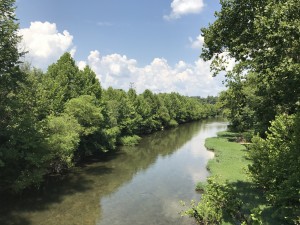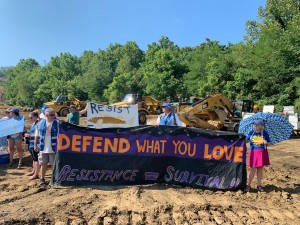From an Article by Jeff Sturgeon, Roanoke Times, June 1, 2020
Builders of the Mountain Valley Pipeline can bore under the Roanoke River to set the pipe at that location instead of an earlier plan to dam the water and dig a trench, energy regulators say.
Mountain Valley cannot currently undertake the river crossing in eastern Montgomery County, however, because of a lack of federal authorizations. Construction began in 2018 but has been on hold since fall.
On May 20, Mountain Valley asked the Federal Energy Regulatory Commission for approval to change methods for its planned crossing of one of the region’s major rivers. Its application described the creation of pits on opposite sides of the river where the pipeline route and river intersect in Lafayette. One pit would be nearly 31 feet deep, the other nearly 22 feet. A crew would bore horizontally 316 feet and install the 42-inch pipe directly behind the boring machine, passing at least 6 feet beneath the river bottom, the application said.
The project could be completed in 90 days, the filing said.
Mountain Valley spokeswoman Natalie Cox, asked for the company’s reason for the change, said variances to use boring “for specific crossings” would allow Mountain Valley to “complete final restoration work for larger sections” of the pipeline’s right of way.
In giving its consent May 27, FERC said the decision to bore rather than block the river and lay pipe in a trench “will result in a reduction in impacts on aquatic resources by avoiding impacts to the stream bank and channel.”
The earth in that location is dominated by shale and limestone with a high percentage of gravel and cobbles, conditions that will require the application of clay solution to lubricate the cutting process, the application said. MVP plans to obtain 500,000 gallons of water from a municipal source and not use river water. MVP said it “does not anticipate conditions” that would cause drilling fluids to be released into the environment.
The drilling fluid was described in the application as non-petroleum based, non-hazardous and “non-toxic to fish” at the low concentrations contemplated by MVP’s plan, the application said.
David Sligh, a former senior engineer with the Virginia Department of Environmental Quality, warned that the fluid could leak out and damage aquatic life. Environmental safety depends on MVP complying with its plan and government rules, but “MVP’s atrocious record of noncompliance in VA and WV provides no assurance that this will happen,” according to an email written by Sligh, conservation director at Wild Virginia, a litigant in legal challenges designed to stop the project.The obstacles blocking progress by MVP include a decision by the U.S. Fish and Wildlife Service to revisit an earlier ruling that found that the project would not harm endangered species. Permission from the U.S. Army Corps of Engineers to cross streams and wetlands is also outstanding, though Sligh said a decision to bore would make having that permission unnecessary for the Roanoke River crossing. Finally, a permit needed to cross the Jefferson National Forest is under review by the U.S. Forest Service.


